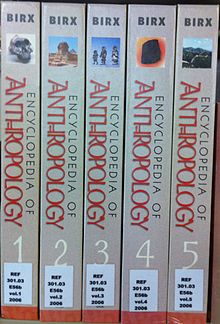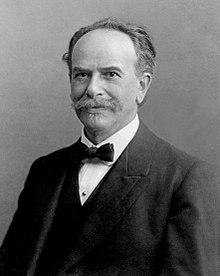Anthropology

Anthropology [anth-row-pahl-O-gee] is the study of human beings in the past and present.[1] The word anthropology has two roots: [ anthrop- ] and [ -ology ]. Anthrop- means “about human beings,” and -ology means “a type of science."[2][3] Anthropology is a type of science about human beings. A person who studies anthropology is called an anthropologist.
The main goal of anthropology is to answer the questions: What makes us human and why?[4]
Anthropology is a biological and historical social science that helps us learn how groups of people are the same, and how they are different in all parts of the world.[5] Anthropologists do research in many places and study how people live now and how they may have lived in the past. They research in modern cities, small villages, tribes, and in the countryside.[5]
Four fields[change | change source]

Anthropology uses a "four-field approach" that divides anthropology into four big kinds:
- Archaeology - The study of how people lived in the past.[5]
- Biological anthropology - The study of how people adapt to where they live and how bodies changed over time (evolution).[5]
- Linguistic anthropology - The study of how people speak and the words they use.[5]
- Sociocultural anthropology - The study of how people live their lives now and how they may have lived in the past.[5] It combines social and cultural ideas about people.
Archaeology[change | change source]
Archaeology is the study of humans from the past. People who study archaeology are called archaeologists.
Archaeologists look at things that past people left behind to know how they lived. They look at tools, bones, and past houses to see how people in the past are not the same as people that live today.[1][4][6]
Here are some other examples of what archaeologists like to study:
- Historical archaeology: the study of what people wrote down and talked about in the past
- Ethnoarchaeology: the study of people's things
- Experimental archaeology: tests different ways to study archaeology
- Community archaeology: makes sure that other people can help study anthropology
- Cultural resources management: studies the past cultures and arts of humans
Biological Anthropology[change | change source]
Biological or physical anthropology studies human bodies and how they change over time.
They look at how humans live in nature and how their bodies change because of where they live. They also study how human beings and apes and monkeys are alike. Sometimes biological anthropologists study human and animal bones to learn about how past humans lived.[1][4][7] They are also called physical anthropologists.
Here are some other examples of what biological anthropologists like to study:
- Paleoanthropology: the study of human bones from a very long time ago
- Bioarchaeology: the study of human bones from the past (but not as long ago as paleoanthropology)
- Primatology: the study of monkeys and apes
- Paleopathology: the study of human diseases from the past
- Human biology: the study of how human bodies work
Linguistic Anthropology[change | change source]
Linguistics is the study of how people talk.
Linguistic anthropologists study sounds and how they go together to make words. Then they study what the words mean and how people use them. Linguistic anthropology also studies how language changes what people think and how people change language. No two people talk the same way, so linguistic anthropologists want to know why that happens.[1][4][8]
Here are some other examples of what linguistic anthropologists like to study:
- Languages: how people talk in different places
- Communication: how people tell each other things
- Socialization: how people learn languages when they are little
- Language ideology: how people feel about language
- Code-switching: when someone uses more than one language
Socio-Cultural Anthropology[change | change source]
Socio-Cultural Anthropology is the study of human societies and cultures.
It looks at how human beings understand the world around them and how they act with the people around them.[9] Socio-cultural anthropologists study living people by going to their homes and learning about who those people are and what they do. They write about people in places all over the world to see why people are different. Some socio-cultural anthropologists study medicine in these places and some look at how babies grow up in other places.[1][4][10]
Here are some other examples of what socio-cultural anthropologists like to study:
- Witchcraft: the practice of magic
- Taboo: things that are not allowed
- Gender identity: what gender someone thinks they are
- Cultural materialism: how people and societies change
- Rites of passage: how people celebrate change, especially as someone gets older
Other Kinds of Anthropology[change | change source]
Even though there are four main kinds of anthropology, there are a lot of different kinds of anthropology within the four main kinds. Here are some examples:
- Feminist Anthropology
- the study of women and anthropology. Feminist Anthropology is also used to study equal rights for women.
- Forensic anthropology
- the study of humans and the law.
- Processual archaeology
- uses science to study the history of humans and their things.
- Applied anthropology
- uses the different ways to study anthropology to answer questions.
- Anthropology of media
- Medical anthropology
- Evolutionary anthropology
- the study of how human biology and culture has changed from the past to the present.
- Racial anthropology
- Racial anthropology is the study of different human races and their classifications.[11]
Rules of Anthropology[change | change source]
Like everything in life, anthropology has a set of rules that every anthropologist needs to follow. The rules try to make sure that no one gets hurt or mad when studying other people. Here are some of the rules:[12]
- To make sure no one gets hurt when studying anthropology
- To respect and be nice to humans and animals
- To make sure any items used to study people are well taken care of
- To work as a team
Notable people[change | change source]


This is a list of important people who studied anthropology.
- Franz Boas (1858-1942)[13]
- Boas is known as the "Father" of American anthropology because he helped spread anthropology throughout the United States.
- He studied socio-cultural anthropology, biological anthropology, and archaeology.
- Claude Levi Strauss (1908-2009)[13]
- Levi Strauss studied how humans think and act the same everywhere around the world.
- Émile Durkheim (1858-1917)[13]
- Durkheim studied how people in societies make new ideas and groups.
- Bronisław Malinowski (1884-1942)[13]
- Malinowski studied how people in different places act and how they are different from people in other places.
- Margaret Mead (1901-1978)[13]
- Mead studied how there are different ways people raise babies and how those babies grow up.
- Marcel Mauss (1872-1950)[13]
- Alfred Radcliffe-Brown (1881-1955)[13]
- Radcliffe-Brown studied how people put their lives in order in different places all over the world.
Notes[change | change source]
- Charles Darwin, On the Origin of Species, 1861
- Charles Darwin, The Descent of Man, and Selection in Relation to Sex, 1871
- Thomas Henry Huxley, Man's Place in Nature, 1863
- Rudolf Virchow, Anthropological Papers, 1891
- Desmond Morris, The Naked Ape, 1967
- Jane Goodall, In the Shadow of Man, 1971
- Richard Dawkins, The Selfish Gene, 1976
- E.O. Wilson, On Human Nature, 1979
- E.O. Wilson, Consilience: the unity of knowledge, 1998
- E.O. Wilson, The social Conquest of Earth, 2012
- Jared Diamond, The Third Chimpanzee, 1991
- Jared Diamond, Collapse: how societies choose to fail or succeed, 2005
- Richard Wrangham, Catching Fire: how cooking made us human, 2009
- Ulf Hannerz, Anthropology's World: life in a twenty-first century discipline, 2010
- James D. Faubion, An Anthropology of Ethics, 2011
References[change | change source]
- ↑ 1.0 1.1 1.2 1.3 1.4 "What is Anthropology? - Advance Your Career". www.americananthro.org. Retrieved 2019-11-15.
- ↑ "-ology | Origin and meaning of suffix -ology by Online Etymology Dictionary". www.etymonline.com. Retrieved 2019-11-15.
- ↑ "anthrop | Search Online Etymology Dictionary". www.etymonline.com. Retrieved 2019-11-15.
- ↑ 4.0 4.1 4.2 4.3 4.4 Doda, Zerihun (2005). Introduction to Sociocultural Anthropology (PDF). Ethiopia Public Health Training Initiative: USAID.
- ↑ 5.0 5.1 5.2 5.3 5.4 5.5 "anthropology | Definition, Branches, History, & Facts". Encyclopedia Britannica. Retrieved 2019-11-15.
- ↑ Binford, Lewis R. (1962). "Archaeology as Anthropology". American Antiquity. 28 (2): 217–225. doi:10.2307/278380. ISSN 0002-7316. JSTOR 278380. S2CID 162242910.
- ↑ Larsen, C. S. (Ed.). (2010). A companion to biological anthropology (Vol. 20). John Wiley & Sons.
- ↑ Duranti, A. (Ed.). (2009). Linguistic anthropology: A reader (Vol. 1). John Wiley & Sons.
- ↑ Ingold, Tim. 2005. Companion Encyclopedia of Anthropology. New York: Routledge.
- ↑ Garbarino, M. S. (1983). Sociocultural theory in anthropology: A short history. Waveland Press.
- ↑ Rowe, Chandler W. "Genetics vs. physical anthropology in determining racial types." Southwestern Journal of Anthropology 6.2 (1950): 197-211.
- ↑ American Anthropological Association. 1998. Code of Ethics
- ↑ 13.0 13.1 13.2 13.3 13.4 13.5 13.6 Erickson, Paul; Murphy, Liam (2013). A History of Anthropological Theory. Toronto: University of Toronto Press.
Other websites[change | change source]
- Anthropology -Citizendium
